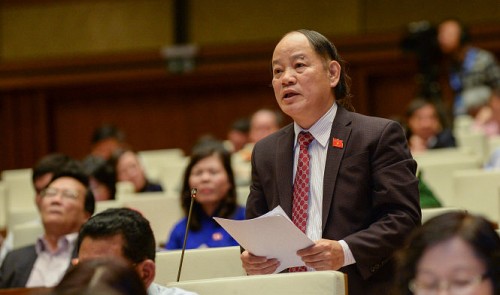Reforms in both economic institutions and human resources are necessary for Vietnam to implement the Trans-Pacific Partnership (TPP) pact reached last month by 12 countries, National Assembly deputies have said.
They voiced their opinion at a meeting on Monday focusing on the country’s social and economic development.
One of them was Tran Khac Tam, a deputy from the southern province of Soc Trang, who said Vietnam should be aware of both the opportunities and challenges the TPP accord would bring in order to avoid becoming the people who are simply employed by foreign firms on their home soil.
The TPP deal, which aims to liberalize commerce in 40 percent of the world's economy, was reached on October 5 following five years of negotiations between 12 countries, including Australia, Brunei, Canada, Chile, Japan, Malaysia, Mexico, New Zealand, Peru, Singapore, the U.S. and Vietnam.
The accord still needs to be ratified by lawmakers in the participating nations.
If Vietnam wants economic integration through the pact, it must improve both economic institutions and human resources at the same time, Tam said.
While Vietnam has revised many laws, including the Law on Enterprise and Law on Investment, to bring its economic legislation closer to global norms, the country has yet to improve its human resources proportionately, the deputy said.
He pointed out that the country has not got its people ready for integration, as many officials are still not good at foreign languages, which is a minimal requirement.
Citing data from the World Economic Forum, Nguyen Ngoc Hoa, a deputy from Ho Chi Minh City, said that Vietnam now ranks 56th out of 140 economies in the world in terms of competitive capability, lower than many other Southeast Asian nations, including Singapore, Malaysia and Thailand, which stand at 2nd, 18th and 32nd respectively.
Hoa added that Vietnam also ranks low in many other fields in the world, such as economic institutions (85th), financial market development (84th), education-science (95th), and sophistication in business organization and administration (100th).
The lawmaker underscored that the national economy needs to have new motives, especially for economic institutions and science and technology, so as to boost in-depth and sustainable development.
Huynh Nghia, a deputy from the central city of Da Nang, pointed out that one of the current weaknesses of the Vietnamese economy is the manipulation of interest groups.
“The collusion between many lawmakers and tycoons is posing the largest potential danger to the optimal exploitation of natural resources,” Nghia said.
The worrying issue here is not only the increasing manipulation of interest groups but also the fact that Vietnam has yet to have a legal system and a management mechanism strong enough to prevent such dishonesty, he said.






















































